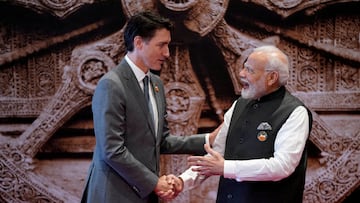What evidence does Trudeau have to accuse India of being involved in the death of Hardeep Singh Nijjar?
Prime Minister Justin Trudeau says that Canada is “pursuing credible allegations” that the Indian government is linked to the killing of a Canadian citizen.

Hardeep Singh Nijjar, a prominent Canadian Sikh leader, was gunned down by two masked assailants in June outside a Sikh temple in Surrey, British Columbia. Speaking to the House of Commons on Monday, Prime Minister Justin Trudeau accused the Indian government of having a hand in the killing.
“Canadian security agencies have been actively pursuing credible allegations of a potential link between agents of the Government of India and the killing of a Canadian citizen, Hardeep Singh Nijjar,” said Trudeau.
“Any involvement of a foreign government in the killing of a Canadian citizen on Canadian soil is an unacceptable violation of our sovereignty. It is contrary to the fundamental rules by which free, open and democratic societies conduct themselves,” he added.
What evidence does Trudeau have to accuse India of being involved in the death of Hardeep Singh Nijjar?
The PM didn’t give any specific evidence but said that Canadian authorities are “working closely and coordinating with our allies on this very serious matter.” Trudeau also said during his emergency statement to the House of Commons that the week before he “personally and directly” spoke with Indian Prime Minister Narendra Modi “in no uncertain terms” about the murder while attending the G20 summit in New Delhi. “Canada has declared its deep concerns to the top intelligence and security officials of the Indian government,” said the PM.
He urged the government of India to “cooperate with Canada to get to the bottom of this matter.”
Indian and Canadian diplomats expelled
Nijjar was designated a terrorist by Indian security agencies in 2020 and allege that he was the head of the militant separatist group the Khalistan Liberation Force. He did support a Sikh homeland in the form of an independent Khalistani state. India has been applying pressure on countries with large Sikh communities such as Canada, which has the highest outside of their home state of Punjab in India, to crack down on the movement.
The public allegations are putting further strain on an already frosty relationship between the two countries. On Monday, Foreign Affairs Minister Mélanie Joly announced that Canada expelled India’s top intelligence agent in the country, Pavan Kumar Rai. In response, Indian in a statement on Tuesday said that it was giving five-day notice to a senior Canadian diplomat to leave the country.
Deaths of two other Sikh separatists thought to be connected
Just days before Nijjar was murdered, Avtar Singh Khanda, a self-styled chief of the banned Khalistan Liberation Force, died in a Birmingham hospital from blood cancer. The month prior, one of India’s ‘most wanted’ terrorists, Paramjit Singh Panjwar, was shot down by two gunmen in Lahore, Pakistan.
There has been speculation among pro-Khalistan sympathizers and Indian nationalists that all three deaths are linked. For example, in the case of Khanda, his supporters suspect that he didn’t die of natural causes but instead of food poisoning.






